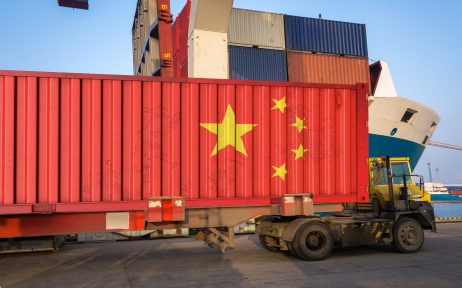‘De-risking’ and What It Means for China
Beijing has a lot of issues with the publicly released outcomes of the G-7 Summit, which took place in Hiroshima from May 19 to 21. The leaders of Germany, France, Italy, Japan, Canada, the United Kingdom, the United States, and the European Union collectively expressed their support for economic “de-risking” in their economic cooperation with China in addition to supporting strategic and political views hostile to China.
Beijing’s response to the G-7 summit implies that Beijing believes the industrialized democracies are becoming more supportive of what they refer to as a U.S.-led strategy to “contain” China. This inaccurate view has numerous significant and detrimental repercussions for China.
Chinese officials and journalists have been aggressively courting Europe lately, pleading with the continent to separate itself from the United States and, more particularly, to avoid participating in the so-called American containment strategy. The main argument has been that Europeans should be on the lookout for the United States’ self-serving use of them as “puppets” against their own interests. This framing painted Washington as the adversary while China welcomed Europe with open arms.
However, Beijing finds the trendlines dismal despite Chinese efforts. Early in 2023, European nations began to take steps to impose limitations on Chinese investment, semiconductor exports to China, and China’s ability to participate in the European renewable energy industry. Chinese attitudes regarding Western Europe have become considerably more pessimistic, increasingly linking containment with de-risking. Director General for European Affairs at the Ministry of Foreign Affairs Wang Lutong said on May 10 that “Europe gives [China] a stab in the back… bullies China on economic issues.” The state-owned Global Times published an editorial on May 11 criticizing Europe’s “submission and dependence on Washington’s comprehensive containment strategy against China.”
Do you like this article? For full access, click here to subscribe. $5 a month is all.
Beijing saw the G-7 result as a continuation, or even an acceleration, of the downward trend. Therefore, on May 20, the G-7 was accused of “containing” China by the Chinese Foreign Ministry. On May 25, a pundit for the Xinhua News Agency said in response, “the G7 interprets its own ‘risk’ as only induced by China, or in other words, only by containing China can it get rid of the risk.”
This is true even though the G-7 communiqué made it clear that the group does not support containment: “Our policy approaches are not designed to harm China nor do we seek to thwart China’s economic progress and development.”
Beijing doesn’t appear to be able to understand or care about the quite distinct histories of “containment” and “de-risking.”
In the context of the Cold War, containment refers to American strategy toward the Soviet Union. It comprised military and political actions to stop Communist parties from seizing power of further nations, most likely under Soviet authority. A general prohibition against doing business with the Soviet Union was the economic component. The majority of Chinese believe that Washington’s present strategy toward China is one of containment, with the goal of halting China’s rise to economic might and global influence in order to maintain Washington’s hegemonic position in the Asia-Pacific.
The United States, according to Xi Jinping, is engaging in “comprehensive containment” and “all-around containment, encirclement, and suppression of China.” Other Chinese officials claim that the U.S. is “using every tool at its disposal to repress China.” These are blatant overstatements. China benefited from an almost $400 billion surplus in its trade with the United States in 2022. Washington made no significant efforts to prevent China from constructing military installations in the South China Sea. Thousands of Chinese students are still trained yearly in the STEM subjects by American colleges.
As a result of the Tiananmen Massacre, the United States put a weapons embargo on China in 1989. As of today, this embargo has been expanded to include limitations on some high-tech exports, such as semiconductors. Given that China is now the United States’ greatest and most probable future foe, the strategy is not irrational. In a few crucial industries, China is in fact also actively divorcing its economy from that of the United States.
De-risking is very different from containment and has more modest and defensive goals. Containment is a tactic used by one great power to block a challenge by another great power for worldwide strategic leadership. This phrase was first used in regard to China’s economic ties in a speech given by Ursula von der Leyen, the president of the European Commission, in March 2023.
Europe has no hegemonic position to protect and does not intend to exercise strategic leadership in the Asia-Pacific area. Regardless of the strongest nation in the area, the Europeans will do commerce with it. De-risking instead aims to prevent over-dependence on a potentially troublesome supplier. Through its recent actions, China has positioned itself in that group.
The Chinese government now often penalizes trade partners over political issues by using its economic might. The example of Australia is instructive. Beijing quickly imposed import restrictions on a number of Australian goods after Canberra asked the World Health Organization to look into the causes of the COVID-19 epidemic. Beijing was already enraged with Australia for taking action to stop Chinese Communist Party influence in Australian politics. Similar economic pressure from China has been experienced by European nations.
The structure of China’s political system is a related issue. Due to the necessity to preserve the Xi Jinping personality cult and the absence of a public election mandate for ongoing one-party rule, the leadership feels uneasy. At the same time, the extraordinarily powerful state has the power to enact very harsh laws that may stop supply chains from passing through China.
Do you like this article? For full access, click here to subscribe. $5 a month is all.
Lockdowns continued until 2022 due to the Chinese Communist Party’s paramount need to maintain its good name and its immense social control, which delayed China’s restoration to full output and increased global shortages and inflation. China’s internal politics seem to be driving the nation toward a conflict over Taiwan, which would severely disrupt much of China’s global trade for an extended period of time.
In other words, even in the total absence of any desire to stifle China’s economic growth, Europe has adequate reason for lowering its dependence on Chinese supplies for self-defense. The fact that China is unable to distinguish between “containment” and “de-risking” is a result of its failure to examine its own actions, which would be a vital first step in reforming European policies.
The word “de-risking,” which has gained acceptance among American officials, has provided the West European nations and the United States with a unifying framework for a more coordinated China strategy. Beijing’s influence may be somewhat constrained by the major economies of the world making policy changes to reduce their dependence on Chinese suppliers. Grand strategy for the United States has won here, while China’s has lost.
The G-7 Communique provides another proof that China’s attempts to sever ties between Western Europe and the US have failed. In Europe, there is more animosity against China than there is toward the United States due to things like China’s ineffective “wolf warrior” diplomacy, human rights concerns, the Ukraine War, and worries about China’s belligerent gestures toward Taiwan.
It is in China’s long-term interest to profit from its trade links with Europe. Over the concerns of the United States, the Comprehensive Agreement on Investment between China and the European Union was first approved by both parties in 2020, but it now seems to be dead. Europe is also more inclined than ever to take harsh action against China in response to an assault on Taiwan.
Another example of Beijing’s lack of strategic empathy is the confounding of de-risking with containment. The notion that foreign nations may legitimately see parts of China’s practices as problematic or menacing has limited room in China’s political environment. Beijing believes that a large portion of the confinement is self-inflicted.













